Release Date: December 17th, 1938
Series: Merrie Melodies
Director: Ben Hardaway, Cal Dalton
Story: Tubby Millar
Animation: Herman Cohen
Musical Direction: Carl Stalling
Starring: Danny Webb (Egghead, Biff Stew, Charlie McCarthy), Mel Blanc (Boxing Instructor, Mailman), Tex Avery (Referee), Joe Twerp (Announcer)
With the final half of the two Hardaway and Dalton films released on December 17th, 1938, Egghead bids adieu in his final cartoon. While still reeking of terminal Hardaway and Dalton disease, Count Me Out is a comparatively more ambitious entry from the duo, even boasting early references to ACME.
Now cast as a country bumpkin, Egghead dreams of going to the city to become a champion prizefighter. After receiving lessons from a snooty record, he aims to tackle reigning champion Biff Stew, where his training is put to the test.
Iris in on a shot of Egghead's mailbox (airmail!), scored to an unassuming, gentle accompaniment of "Let That Be a Lesson to You". The camera trucks out...
...and pans to reveal our pint-sized Penner engrossed in a flyer, reading it like a typewriter with appropriate sound effects to boot. The rural backgrounds are surprisingly moody and gorgeous, with vibrant hues of greens, blues, purples and yellows to remain quaint but spirited. With the brushy, borderline blotchy brushstrokes, the landscape seems more akin to a painting than an actual cartoon background, which by no means is a complaint.
Through means of a close-up, the flyer is revealed to be an advertisement for ACME Correspondence School of Boxing for a mail fee of $1.00. Thus marks the third ACME reference in the cartoons, preceded by Buddy's Bug Hunt and Porky's Poppa.
Aided by some floaty, weightless animation, Egghead vows to be a "REEEAL MAAAN!", fishing a dollar out of his pocket and wrapping it in the flyer.
Sauntering over to his mailbox, he prepares to send off the goods... until unearthing a toy plane from the depths of his mailbox, feeding the flyer into the plane. Such explains the airmail aspect.
Nothing short of a miracle, Hardaway and Dalton actually execute some fittingly snappy, abrasive timing as a mail coach screeches almost immediately after Egghead sent the plane flying. Nice speed and weight on the coach, especially as it yanks to a stop, the roof of the coach momentarily breaking free of its hinges from the impact.
So, to balance out the high of a successful piece of timing, Hardaway and Dalton do what they love best by dragging amusing jokes in concept out for a painfully long amount of time. Animated by Gil Turner, instead of having the cornpone postman (scored by "The Arkansas Traveler" to assert his rural origins) say "Woulda been here sooner, but the bridge was out!" and calling it a day, which is funny on its own, the mailman and Egghead have a brief exchange of dialogue ("Here ye be, Johnny!"--referencing Old Timer from Fibber McGee and Molly--"That's sure fast service!") before the mailman rambles on for an infuriatingly long amount of time:
"Woulda been here sooner, but I... I say I WOULDA BEEN HERE SOONER, but the bridge was out! ENTIRELY GONE! They say it ain't there no more! Was washed out!"
While that in itself is enough of an explanation for that lethal tendency to ruin jokes that Hardaway in particular adored, Egghead and the mailman still keep going, with Egghead giving an unnecessary and uninspired "Okay, pop!" and the mailman croaking "Well, we can't please ev'rybody!" As is usually the case, Webb and Blanc are fine on their own, and the energy in Blanc's vocals is infectious. It's the dialogue itself that kills it, rather than who's saying it.
Wipe to Egghead admiring the contents of his delivery: "Boxin' gloves, punchin' bag, dumbbell... huh! All sortsa things and stuff!" The addition of smelling salts is a relatively amusing gag as well.
In one of the most ambitious moves from a Hardaway and Dalton cartoon, Egghead's record of boxing instructions is displayed as a close-up photograph rather than painting.
And, after a few seconds, it begins to move, with a nice easing in to the cycle of it spinning. Very creative and refreshing to see, especially from a H-D effort. Carl Stalling's circuitous accompaniment is the perfect accent to the movement.
Dissolve to Egghead listening to the record, the instructor voiced (of course) by Mel Blanc. All geared up in his boxing shorts and gloves, dumbbells and punching bag in the background, Egghead is raring to go, thumbing his nose and shadow boxing as the record instructs him to strike the proper form: "Head back and chest out!"
Egghead does the opposite, sucking his chest inward as he cycles his dukes in front of his head. While the line of action of the pose is nice, the silhouette is a tad cluttered and loses its clarity. Regardless, it's clear that his chest is certainly not out, and, in a derivative of Tex Avery's gag style, the instructor on the record takes notice and barks "I SAID CHEST OUT!"
He obliges dutifully.
The next gag is a bit flimsy in that it feels purely like something trying to be funny and nothing else. Just as soon as the instructor tells Egghead to take a deep breath, a phone call on the other end cuts him off.
"Oh, pardon me. Someone's on the phone."
A long pause as Egghead refuses to exhale.
Soon, the inevitable occurs as he collapses on the floor, blue-faced. With that, the instructor keeps on talking. A quick "As I was saying" would help to bridge the scene together a bit more, but it feels like the instructor was waiting for Egghead to collapse rather than Egghead waiting for the instructor. Too deliberate.
In any case, Egghead finally gets to show off his boxing skills, jabbing aimlessly in circles. As the instruction on the record gets faster, speeding up in pitch and tempo, so does Egghead, soon turning into a flesh colored whirlwind. While the build-up does seem comparatively slow, it certainly is refreshing to see some speed in the H/D cartoons.
One of the more amusing gags is an acknowledging of the audience. While Egghead recovers from his fit, panting like a dog, Mel Blanc persnickety scorn tuts from the record: "Stick in your tongue! There's people looking at you!"
While the animation is relatively ugly and floaty, Egghead hastily stuffing his tongue back in his mouth gets some polite laughs for the all consuming stare towards the audience. The Mel Blanc record seems pleased, cooing "That's better."
"Now, let's punch the bag a bit." Egghead tinkers up to his punching bag, marked by a staccato xylophone score from Carl Stalling. The blue irises present in his unboxing close-up reappear as he cautions a glance at the record player for further instruction.
Common with many H/D gag deliveries, Egghead punching the bag and having it stick to its mount suffers from slow timing and a lack of proper weight. Thus, when he turns around and heaves a dubious shrug all too deliberately, the reveal of the gag as the punching bag socks him in the head and sends him flopping to the floor isn't very rewarding. The turn around feels too obvious and staged, not a natural gesture, and the spin he does in the air is much too sluggish and weightless.
Mel Blanc's narration goes from purposefully patronizing and slightly amusing to annoyingly patronizing--due to poor vocal direction--as he chirps "Upsie daisy!" Egghead slowly rises to his feet, and after a few adjustments, is ready to go.
Relatively anticlimactic punching ensues.
The highlight of the sequence borrows the gag sense of Tex Avery, almost like a rescue operation of comedy. Egghead ceases his hitting upon the direction of "That'll be all for today." Unfortunately for him, the bag continues to hit itself on its own, swinging back and forth. Mel, growing more impatient, reprimands "I said that'll be ALL for today!"
"STOP PUNCHIN' THAT BAG!"
And, rather than having the bag deflate on its own after bearing Mel's ear-splitting yell, the Hardawayian tendency to drag out gags actually elevates the joke here as Egghead whips out a double barrel shotgun.
BAM!
Shot to shreds, the bag has finally stopped. All in a day's work.
A diagonal wipe reveals Egghead's next lesson (despite the finality in the wording of "that'll be all for today", as opposed to "that'll be all for this lesson".) Now, he's faced with an automatic boxing opponent: a bunch of boxing gloves labeled with their respective moves, "haymaker" reeking of Hardaway-ian gag sense, hooked up to a conveyer belt and protruding through a plank of wood.
When Egghead starts the contraption by stepping on a button, a very brief jump cut is inserted to show a close-up of the action. Rather than reading as theatrical, it's instead jarring and completely arbitrary, because the cut immediately after reverts to the same wide staging, and the button is clear to see as is.
In any case, another mild, anti-climactic boxing scene commences, Mel Blanc's fervent, tongue-tied narration incongruous with the comparatively leisurely pace of the boxing itself. His stilted, relatively monotonous vocals thanks to poor direction do little to eliminate the weak points.
Thankfully, that seems to be the final lesson. Egghead survives unharmed, proudly hiking his boxers up to his chest with an electric twang from Treg Brown. Carl Stalling's music score of "Let That Be a Lesson to You", while nice from start to finish, sounds especially nice with a chipper, brief piano solo and violin coda.
As promised, the record unearths a robotic hand to give Egghead his diploma.
Holding up his diploma like a prize, Egghead taps into some Joe Penner catchphrases as he drawls victoriously: "It's AMAAAAZING!"
With that, he rushes to get in his fancy digs for the city, still looking like a total bumpkin with the tattered, patched pants.
Admiring himself in the mirror, more Penner-isms lost to the test of time ensue. While not to the comedic effect of his deliveries in, say, Cinderella Meets Fella, where he recites the same catchphrase, Webb's vocals are hard to hate as Egghead mumbles "I'm a professional prizefigher!"
"Huh, huh, huh..."
"I can't get over it, huh, huh, huh..."
The next bit of Egghead whooping and giggling to himself, bouncing in mid-air with no lip sync, is more uncanny and poorly directed on all fronts rather than funny.
So preoccupied in his pompous, odd giggling, he doesn't notice the button for the boxing machine on the floor and steps right on it. The "haymaker" glove lives up to its name, knocking him out of his jacket and tattered pants, suitcase flopping to the ground.
Cross dissolve from a dazed Egghead to the scene of the big fight. The coloring and architecture on the arena's façade is particularly nice, very Art Deco with sleek, smooth curves--a total contrast to Egghead's country bumpkin ways. A marquee out front bills the fight between "Biff Stew"--another input almost undoubtedly from Hardaway--and Egghead.
Discordant murmur from the crowd eventually drowns out Stalling's sporty score of "Hooray for Hollywood" as a shot of the ring is revealed. The backgrounds of the spectators verge on ghastliness in a few places, but this wide shot is certainly colorful and full. Contrasting hues with the yellow of the light and blues of the darkness are very nice.
Tex Avery is no stranger to lending his vocals to cartoons, whether his own or for his coworkers. Here, his distinctive, guttural yelling belongs to the referee, who introduces the fighters. While the poses are constantly moving and hardly held, making for a disorienting, weightless effect, the poses themselves are nice and energetic. The dog referee's ears flop and wiggle and trail behind him as he booms "IN THIS CORNERRRR... "
"THE CHAMPION OF THE WORLD..."
"BIFF.... STEW!!!"
Many of the designs in the H/D efforts are less than attractive, and could be fixed with a few refinements. Biff Stew is indeed incredibly ugly in an accidental sense and not purposefully ugly. He should be ugly, serving as the reigning champ, but the giant, pink, fleshy lip, round bald head, and low ears that look elfish and not doglike make him a bit of an eyesore.
In any case, Biff rakes in the applause, shaking his gloved fists in an awkward, slow cycle. The cycle from the backside doesn't fare much better, but is purely fluff to accompany the lights scrawling along on his back: BIFF'S STEW WORLD'S CHAMPION.
The next gag would be borrowed and repurposed by Chuck Jones in his 1943 cartoon To Duck or Not to Duck. When introducing Egghead, the Tex Avery voiced referee suddenly collapses into a fit of giggles, unable to introduce him because of just how pathetic he is.
Chuck's much snappier and funnier timing of the gag wipes the floor of this one, the animation of the referee weightless and floaty, slow, but Tex Avery's laughter is a big redeeming quality. Even in lesser cartoons such as these, the pure joy from Avery's vocals can't be contained.
And, unlike in Duck, the referee doesn't even get to utter his name. Instead, clinging to the ropes of the boxing ring, he falls out into the crowd from laughing too hard. Note the ghoulish characters in the background
The next sequence feels oddly disjointed and at odds with itself. With the boisterousness of the previous scene out of the way, the next scene sways in the complete opposite direction, feeling deliberately and confusingly slow. There's a brief cut of Egghead putting his instructing record on the record player (because of course he brought it along) before cutting to a shaggy dog referee.
He signals for a huddle, and instantly Biff's managers herd into the scene, closing Egghead out. Their mumbling is hardly visible, and outside of the slow xylophone tinkering of Egghead struggling to squeeze in, Carl Stalling's music score is molasses slow. Perhaps to reference Egghead's own incompetence, and that we should laugh at his exclusion? A snappier scene with a snappier, more energetic score would seem much more appropriate. This is a scene that puts people to sleep.
Regardless, after Egghead crawls beneath the legs of one of the managers, the crowd disperses, revealing everything all for naught.
Egghead's guess is as good as ours.
A bucktoothed dog starts the fight by hitting his knee with a mallet (timed to a stopwatch), prompting his leg to jerk up and hit the bell. Borrowed from Porky the Wrestler, Hardaway and Dalton have the benefit of a comparatively more elastic animation style than the former, though the delivery is slower in comparison.
"There goes the bell!" Egghead's record is all-knowing rather than serving as actual pre-recorded dialogue. "Fly into him! Fly into him!"
Scrambling out of his robe, Egghead guns for the punch, blue irises making a return.
Sadly, the jaunty score of "There's a Brand New Picture in My Picture Frame" seems more rousing than the fight itself, which is remarkably sluggish. Egghead peppers Biff with punches that hardly make any sound, and seems to be moving in slow motion compared to other fight scenes (Porky & Daffy is on the complete opposite of the spectrum, but certainly a showcase of what COULD be done.)
His monotone aside of "It's unbelievable," reflects the thoughts of audiences everywhere. Indeed it is.
One would assume that Egghead's slow running and light punches are a stylistic choice to convey his inadequacy, but Biff's attacks are about three times slower. Gags such as blowing air into his glove and causing it to sock Egghead in the face are completely lost due to molasses timing and thusly little impact. The completely silent, slow laugh he does after inflicting the violence certainly doesn't help.
Drilling Egghead into the ground is, again, unbelievably sluggish. The rate at which his pupils spin around in a daze is the most frenzied piece of action this entire fight has had to offer.
Just as soon as he makes a recovery, Egghead is granted with more interminable, slow violence, the impact of squashing and stretching his head totally lost due to weightlessness and terrible spacing/timing. The same applies for the smacks he receives across the face.
Things slowly pick up once he's knocked out of the ring and into a corner, the dizzy stars and marks making a nice graphic effect as they pop and fizzle in the air.
Meanwhile, the record is still listening, instructing, and patronizing. "Come, come! Remember, you're fighting for dear old ACME!" The instructor's voice now has a posh twist to it and sounds completely different than the voice Mel did when Egghead was training. Poor vocal direction strikes again.
In any case, the record's chides are enough to get Egghead back into the ring.
It's then we segue to an announcer, halfheartedly narrating the entire encounter with a rapid-fire delivery. Though this is purely guesswork, it sounds like the announcer could be Cliff Nazarro, famous for his "double talk" act where he'd combine actual words with nonsense gibberish to make it sound like real sentences. He performed the same act in The Penguin Parade as the emcee of the show.
The unblinking stare of the announcer as he spitfires his narration makes for a nice contrast. Of course, that by itself isn't good enough for Hardaway and Dalton. Throughout the charade, the dog tries to catch a fly skittering around on the table, swiping his hand, closing his fist, slowly opening it... and revealing nothing. Some ink and paint errors are noticeable on his eyebrows, which momentary turn transparent as his eyes widen.
Back to the fight which, thank goodness, is at least somewhat more energetic, slapping and punching sounds accommodating the cloud of dust covering the ring. The addition of dog barking sound effects is certainly a nice touch.
And, to remind us that Egghead is still here, he momentarily peeks his head out of the cloud to yell in the style of Joe Penner before getting socked again.
Attempting to escape the dust cloud also proves futile.
With the ding of a bell, the dust subsides, revealing Biff nonchalantly holding a dazed, loosely swinging Egghead. Dreamlike vibration sounds nearly drown out Stalling's musical accompaniment of "You Go to My Head", which makes the scene more tedious than it already is. Egghead's stunned wobbling in place is excessive, the floaty animation difficult to concentrate with everything moving at once. At one point, it looks like he's dancing more than recovering. He practically slides off-screen in an awkward, stilted gliding motion.
Seeing as Egghead's characteristics are already largely celebrity based, Hardaway and Dalton tack on another caricature as he now sits on a befuddled Biff's lap, imitating ventriloquist Edgar Begen's puppet Charlie McCarthy. Webb previously voiced an offscreen McCarthy caricature in Cracked Ice.
Here, there's an attempt to combine McCarthy-isms and Pennerisms as Egghead does the Penner laugh in McCarthy's voice. While they try to drive the puppet aspect by making Egghead's lip-sync wooden and wide, like that of a puppet's, it doesn't read very clearly and suffers in quality. Biff is certainly no hot item to look at either, as are the crowd members in the background.
As soon as the bell rings, Egghead is back to his punchy self. The flinch he does upon the clang of the bell is at least a clear transition between dazed and normalcy, adding a much needed punch to movement that's been incredibly weightless and slow.
Said slow weightlessness weasels its way back in with Egghead shadow boxing, and a bit in Biff's punch in the face. The impact is unceremonious, with anticlimactic sound effects doing little to enhance it.Egghead is sent plummeting off-screen and crashing into his record player. Stalling's relaxed score of "You Go to My Head" still persists, antithetical to what should be a more climactic and energetic sequence and instead making it feel more still and boring than it already is.
After a handful of dubious blinks, Egghead slips back into Penner-esque sobs. "I don't wanna fight anymore!"
His exit takes much too long to have much humorous merit as Biff grabs him by the shorts, dragging him back into the ring. Much like the captain's voice in Porky the Gob, Blanc's vocals are grating and relatively monotonous as he growls "Where d'ya think you're goin'?"
Reusing the establishing crowd shot from the beginning of the fight, the scene that seems to have the most artistic merit in the cartoon is the shot of Biff punching Egghead so hard that he lands against the ropes of the ring and is sent rocketing straight into the camera. While still sluggish in its execution, the spacing of the animation at least somewhat resembles an elastic quality. The drawings of Egghead himself aren't the most appealing; his right eye is about 3/4ths the size of his left, with the bruising matching the actual scale.
Egghead's collision with Biff, sending them both rotating in the air is, again, very slow and weightless in its impact.
Visibly dazed, with some neat effects on the dizzy lines and stars, Biff traps Egghead beneath him, who is unable to break free.
So, in a rather unclear and unimpactful bit of action, Egghead bits him square on the leg, sending Biff flying into the air rather mechanically. Blanc's "YYYYYEOW!" is at least amusing. The dizzy lines, however, cut off as soon as he gets bitten rather than fading away.
Another slightly more impressive piece of animation is the impact of Biff's fall. His weight is so great that he's sent crashing through the ring, taking the tarp, ropes, and boards with him. While the movement still feels weightless and generic, the wrinkles on the tarp folding into the hole are solid enough and follow at least a little bit of construction.
With that, we cross dissolve on Egghead writhing helplessly on the floor, fading back to the interior of his home. Indeed, yet another dream fake out. I do give props for Hardaway and Dalton not making the shift between reality and unconscious obvious, as the cross dissolve to the start of the fight feels like a natural segue. "It was all a dream" can sometimes be hard to execute in a way that doesn't seem cloying or like a cheat; it does lean on the cheat end here in that it feels they didn't have a proper way to end the cartoon, but doesn't feel too obvious throughout.
Nevertheless, Egghead's boxing days are over as he tosses his record player and equipment out the window.
"I'm through with this! I don't wanna fight no more!" For some odd reason, he sounds more on the verge of tears rather than angry resignation.
The cartoon's end is the most obvious approach.
For all that it's worth, Count Me Out seems to be one of the better Hardaway and Dalton entries, which certainly says a lot. A much bigger improvement than Porky the Gob, Out still suffers from chronic Hardaway-itis, who I do feel is to blame for aspects such as the long, drawn out, unfunny jokes and unfunny jokes in general--Cal Dalton was a much better animator than he was director, but his entries with Cal Howard fared better than his entries with Hardaway. The animation is largely unappealing as well, and Blanc, Webb and even Carl Stalling feel misdirected.
In any case, Blanc, Webb and Stalling do well with that they have; Blanc's "STOP PUNCHIN' THAT BAG!" is a particular highlight, and I do enjoy Webb's Penner-esque deliveries. Tex Avery's bout of laughter as the coach is great, and Carl Stalling's music scores are chronically catchy, even if they don't particularly fit the mood of the scene.
Certain creative decisions, such as the live action footage of the record spinning or Egghead being punched right into the camera are not taken in vain. Hardaway and Dalton were hardly experimental, so to see them break outside of their box is welcoming. The background paintings are also quite vibrant and colorful, even if the paintings themselves sometimes read as haphazard.
Count Me Out is no different than every other Hardaway and Dalton cartoon that suffers the same fate of unappealing designs, poor animation, unfunny jokes, slapdash vocal direction, and overall cognitive dissonance. However, that there are even highlights worth mentioning is a surprise in itself. Compared to Porky the Gob, which just seemed abysmal, Out is easier to stomach. Does anyone really care about preserving and respecting Egghead's dignity?
Which brings us to our brief retrospective on Egghead, who bows his final goodbye. Egghead is hardly what one would call an endearing character, and it's certainly easy to understand why his lifespan is as short as it was. With much of his existence riding on the fact that he's an ode to Joe Penner, his lifespan is pretty finite; Penner was already considered outdated by the '40s, especially considering he passed away in 1941 at only age 36. Tex Avery, who conceived the character and was the first to tack the Pennerisms onto him, obviously harbored no attachment to him and had no issue shunting him over to Cal Howard, Cal Dalton, and Ben Hardaway.
If anything, Egghead is certainly an interesting bit of historical trivia, even if his cartoons aren't that interesting themselves. Daffy Duck & Egghead, written by Ben Hardaway, suffers from many of the Hardaway-isms seen here, despite Tex Avery's direction of the short. Egghead Rides Again is probably the best of the bunch--the one where he's the least Penner-esque and most Avery-esque.
Other than watching Egghead's final goodbye and being a comparatively more tolerable H/D effort, Count Me Out doesn't make much of a case for why it should be watched. In any case, "curiosity killed the cat" seems to be the best case for a recommendation.
Enjoy! It's also available on HBO Max.





























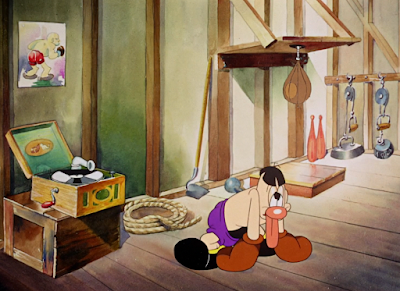



































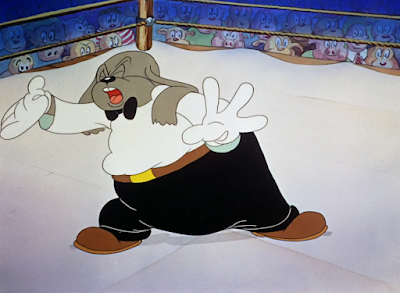










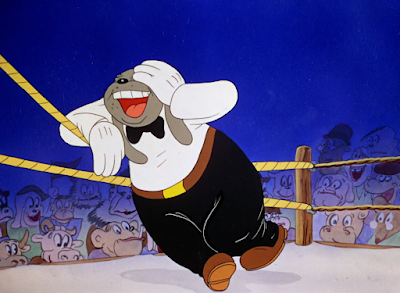










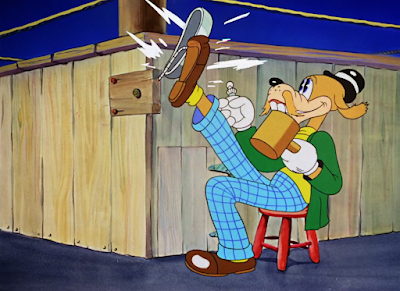





























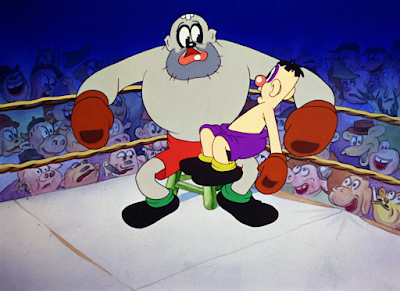




























No comments:
Post a Comment